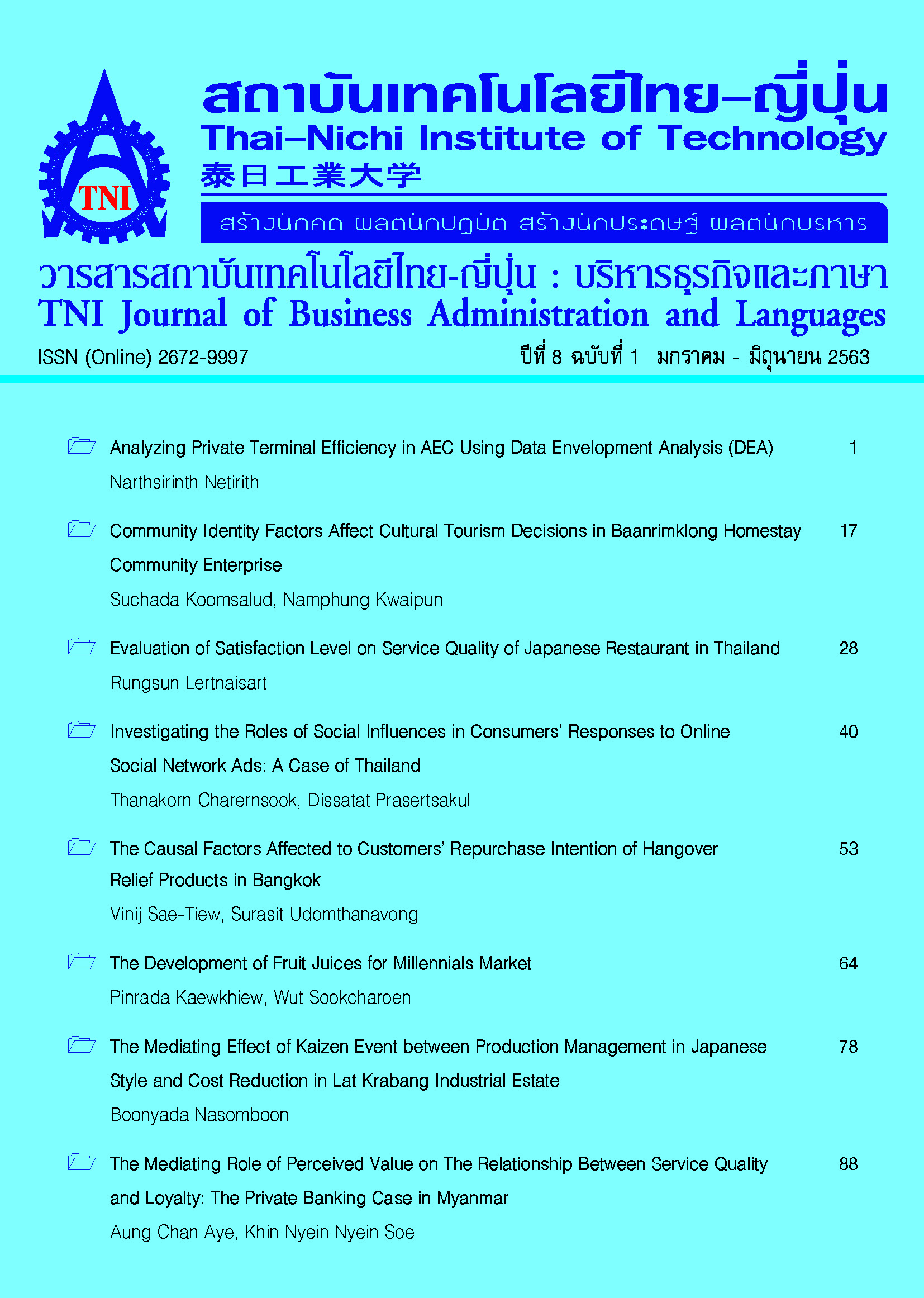ปัจจัยเชิงสาเหตุที่ส่งผลต่อความตั้งใจในการซื้อซ้ำของผู้บริโภค ที่ใช้ผลิตภัณฑ์ลดอาการเมาค้าง ในเขตกรุงเทพมหานคร
Main Article Content
บทคัดย่อ
การวิจัยเรื่อง ปัจจัยเชิงสาเหตุที่ส่งผลต่อความตั้งใจในการซื้อซ้ำของผู้บริโภคที่ใช้ผลิตภัณฑ์ลดอาการเมาค้าง ในเขตกรุงเทพมหานคร มีวัตถุประสงค์ (1) เพื่อศึกษาการรับรู้คุณค่าและการตระหนักรู้ตราสินค้าที่มีผลต่อความตั้งใจในการซื้อซ้ำของผู้บริโภคที่ใช้ผลิตภัณฑ์ลดอาการเมาค้าง และ (2) เพื่อตรวจสอบความสอดคล้องของโมเดลเชิงสาเหตุที่มีอิทธิพลต่อการรับรู้คุณค่า การตระหนักรู้ตราสินค้า ความพึงพอใจและความไว้วางใจในตราสินค้าที่ส่งผลต่อความตั้งใจในการซื้อซ้ำของผู้บริโภคที่ใช้ผลิตภัณฑ์ลดอาการเมาค้าง เป็นการวิจัยเชิงปริมาณโดยรวบรวมข้อมูลด้วยแบบสอบถามจากกลุ่มตัวอย่าง ซึ่งเป็นผู้อาศัยอยู่ในกรุงเทพมหานครและมีอายุตั้งแต่ 20 ปีขึ้นไป ดื่มหรือเคยดื่มแอลกอฮอล์ มีประสบการณ์ในการใช้ผลิตภัณฑ์ลดอาการเมาค้าง จำนวน 454 คน วิเคราะห์ข้อมูลด้วยค่าร้อยละ ค่าเฉลี่ย ค่าเบี่ยงเบนมาตรฐาน และทดสอบสมมติฐานด้วยการวิเคราะห์ตัวแบบสมการโครงสร้าง
ผลการทดสอบของสมการเชิงโครงสร้างพบว่า การรับรู้คุณค่ามีอิทธิพลต่อการตระหนักรู้ตราสินค้าและความพึงพอใจ การตระหนักรู้ตราสินค้ามีอิทธิพลต่อความพึงพอใจและความไว้วางใจในตราสินค้า ความพึงพอใจมีอิทธิพลต่อความไว้วางใจในตราสินค้าและความตั้งใจในการซื้อซ้ำอย่างมีนัยสำคัญที่ระดับ 0.01 แต่ความไว้วางใจในตราสินค้าไม่มีอิทธิพลต่อความตั้งใจในการซื้อซ้ำ
Article Details
นโยบายการรับบทความ
กองบรรณาธิการวารสารสถาบันเทคโนโลยีไทย-ญี่ปุ่น มีความยินดีรับบทความจากอาจารย์ นักศึกษา และผู้ทรงคุณวุฒิในสาขาบริหารธุรกิจและภาษา ที่เขียนเป็นภาษาไทยหรือภาษาอังกฤษ ซึ่งผลงานวิชาการที่ส่งมาขอตีพิมพ์ต้องไม่เคยเผยแพร่ในสิ่งพิมพ์อื่นใดมาก่อน และต้องไม่อยู่ในระหว่างการพิจารณาของวารสารอื่นที่นำส่ง ดังนั้นผู้สนใจที่จะร่วมเผยแพร่ผลงานและความรู้ที่ศึกษามาสามารถนำส่งบทความได้ที่กองบรรณาธิการเพื่อเสนอต่อคณะกรรมการกลั่นกรองบทความพิจารณาจัดพิมพ์ในวารสารต่อไป ทั้งนี้บทความที่สามารถเผยแพร่ได้ประกอบด้วยบทความวิจัย ผู้สนใจสามารถศึกษาและจัดเตรียมบทความจากคำแนะนำสำหรับผู้เขียนบทความ
การละเมิดลิขสิทธิ์ถือเป็นความรับผิดชอบของผู้ส่งบทความโดยตรง บทความที่ได้รับการตีพิมพ์ต้องผ่านการพิจารณากลั่นกรองคุณภาพจากผู้ทรงคุณวุฒิและได้รับความเห็นชอบจาก กองบรรณาธิการ
ข้อความที่ปรากฏภายในบทความของแต่ละบทความที่ตีพิมพ์ในวารสารวิชาการเล่มนี้ เป็น ความคิดเห็นส่วนตัวของผู้เขียนแต่ละท่าน ไม่เกี่ยวข้องกับสถาบันเทคโนโลยีไทย-ญี่ปุ่น และคณาจารย์ท่านอื่น ๆ ในสถาบัน แต่อย่างใด ความรับผิดชอบด้านเนื้อหาและการตรวจร่างบทความแต่ละบทความเป็นของผู้เขียนแต่ละท่าน หากมีความผิดพลาดใด ๆ ผู้เขียนแต่ละท่านจะต้องรับผิดชอบบทความของตนเองแต่ผู้เดียว
กองบรรณาธิการขอสงวนสิทธิ์มิให้นำเนื้อหา ทัศนะ หรือข้อคิดเห็นใด ๆ ของบทความในวารสารวิชาการ สถาบันเทคโนโลยีไทย-ญี่ปุ่น ไปเผยแพร่ก่อนได้รับอนุญาตจากผู้นิพนธ์อย่างเป็นลายลักษณ์อักษร ผลงานที่ได้รับการตีพิมพ์ถือเป็นลิขสิทธิ์ของวารสารสถาบันเทคโนโลยีไทย-ญี่ปุ่น
หากต้องการสอบถามข้อมูลเพิ่มเติมที่
- กองบรรณาธิการ วารสารสถาบันเทคโนโลยีไทย-ญี่ปุ่น
- ฝ่ายวิจัยและนวัตกรรม สถาบันเทคโนโลยีไทย-ญี่ปุ่น
เลขที่ 1771/1 สถาบันเทคโนโลยีไทย-ญี่ปุ่น ซอยพัฒนาการ 37-39 ถนนพัฒนาการ แขวงสวนหลวง เขตสวนหลวง กรุงเทพมหานคร 10250 ติดต่อกับคุณพิมพ์รต พิพัฒนกุล (02) 763-2752 , คุณอาริสา จิระเวชถาวร (02) 763-2600 Ext. 2704 Fax. (02) 763-2754 หรือ E-mail: JBAL@tni.ac.th
เอกสารอ้างอิง
Aaker, D.A. (1991). Managing brand equity: Capitalizing on the value of a brand name. New York: Free Press.
Ampon Shoosanuk, Jompon Vetchakarn, Chaveewan Shoosanuk, & Kitti Charoernpornpanichkul. (2017). The influence of service quality on perceived value, customer satisfaction and customer loyalty of beauty clinic in Bangkok. (In Thai). Srinakharinwirot Business Journal, 8(1), 13-26.
Ahmad, Z., Jun, M., Khan, I., Abdullah, M., & Ghauri, T. A. (2016). Examining mediating role of customer loyalty for influence of brand related attributes on customer repurchase intention. Journal of Northeast Agricultural University (English Edition), 23(2), 89-96.
Bodinphat Singto. (2017). Shopping behavior and factors affecting the repurchase intention of customers in Jatujak market. (In Thai). (Master's thesis, Bangkok University). Retrieved from http://dspace.bu.ac.th/handle/123456789/2257
Butz, J. H. E., & Goodstein, L.D. (1996). Measuring customer value: Gaining the strategic advantage. Organizational Dynamics, 24(3), 63-77.
Chih-Cheng, Volvic Chen, & Chih-Jou, Chen. (2017). The role of customer participation for enhancing repurchase intention. Management Decision, 55(3), 547-562.
Comrey, A. L., & Lee, H. B. (1992). A First course in factor analysis (2nd ed.). Hillsdale, NJ: Lawrence Erlbaum.
Demirgunes, B. K. (2015). Relative importance of perceived value, satisfaction and perceived risk on willingness to pay more. International Review of Management and Marketing, 5(4), 211-220.
Hair, J. F., Hult, G. T. M., Ringle, C., & Sarstedt, M. (2017). A primer on partial least squares structural equation modeling (PLS-SEM) (2nd ed.). Thousand Oaks, CA: SAGE.
Jiang, P., & Rosenbloom, B. (2005). Customer intention to return online: Price perception attribute-level performance and satisfaction unfolding over time. European Journal of Marketing, 39(1/2), 150-174.
Jiratchaya Vichit & Chutimavadee Thongjeen. (2018). Marketing mixed brand equity and trust affecting purchasing decisions of supplementary vitamins in Bangkok. (In Thai). (Master's thesis, Bangkok University). Retrieved from https://scholar.utcc.ac.th/handle/6626976254/3799
Kotler, P., & Armstrong, G. (2018). Principles of marketing (17th ed.). New Jersey: Pearson Education.
Marist, A., Yulianti, L., & Najib, M. (2014). The role of event in building brand satisfaction, trust and loyalty of isotonic drink. International Journal of Marketing Studies, 6(6), 57-65.
Moliner, M. A., Sanchez, J., Rodriguez, R. M., & Callarisa, L. (2007). Relationship quality with a travel agency: The influence of the post-purchase perceived value of a tourism package. Tourism and Hospitality Research, 7(3), 194-211.
Muala, A. (2018). Influence of viral marketing dimensions on customer satisfaction in fast food restaurants in Jordan. Journal of Management and Sustainability, 8(1), 149-155.
Mudzakkir, M., & Nurfarida, I. (2015). The influence of brand awareness on brand trust through brand image (SSRN Scholarly Paper No. ID 2670597). Rochester, NY: Social Science Research Network. Retrieved from https://papers.ssrn.com/abstract=2670597
National Statistical Office Thailand. (2018). The cigarette smoking and alcoholic drinking behavior survey 2017. (In Thai). Bangkok: Pimdeekarnpim.
Natthida Satham. (2014). Marketing mix factors brand loyalty and brand trust affecting customers satisfaction of travel agency in Bangkok and metropolitan area. Journal of Business Research and Administration, (In Thai), 2(1), 1-25.
Oyedele, A., Saldivar, R., Hernandez, M. D., & Goenner, E. (2018). Modeling satisfaction and repurchase intentions of mobile smart wristbands: The role of social mindfulness and perceived value. Young Consumers, 19(3), 237-250.
Phunnapa Kittirattanapaiboon. (2005). Understanding hangover products. (In Thai). Bangkok: Center of Alcohol Studies.
Sareeporn Po-ngam. (2017). Influence of brand image trust and satisfaction on loyalty towards Lazada for the customers in Bangkok. (In Thai). (Master's thesis, Bangkok University). Retrieved from http://dspace.bu.ac.th/handle/123456789/2285
Schumacker, R. E., & Lomax, R. G. (2016). A beginner's guide to structural equation modeling (4th ed.). New York: Routledge/Taylor & Francis Group.
Wisner, J. D., & Stanley, L. L. (2007). Process management: Creating value along the supply chain, USA: Thomson South-Western.
Yan, B. (2019). The influence of customer perceived value on brand equity. American Journal of Industrial and Business Management, 19(9), 609-626.


